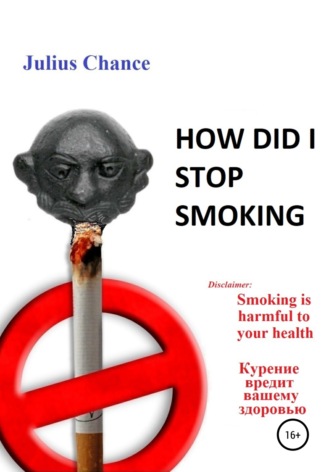
Julius Chance
How did I quit smoking
The third war
Demoralised by my second failures, I smoked a cigarette, lay down on the bed, and began to think slowly. Obviously, I reasoned, if the body does not feed nicotine for a long time, its concentration will gradually decrease to almost zero. For example, if a person is chained to a bed for a year without access to smoking, then he will get rid of the bad habit. Or two months are enough? I went to the medical reference books and was surprised to learn that the half-life period of nicotine in body is only 1-2 days. For cotinine it just 2 times longer. Moreover, already since 3-4 days the body begins to produce the missing nicotine by itself! Thus, even in the time of my ‘first attack’ to smoking, when I lasted for four whole days, I should have been able to win (since the concentrations of both nicotine and cotinine had already fallen to very low levels). However, this did not happen. Why? One of my own assumptions was that with long-term smoking, the cell gets used to increased levels of nicotine. Therefore, if you lower the level of nicotine in it by abstinence, it will begin to experience nicotine hunger and force a person to smoke. Although on the third day of abstinence, the body itself produces nicotine, but, apparently, only in those normal doses that the body needs, and not in those increased ones the cells of an avid smoker are accustomed to. How long the abstinence must be sustained for the cell to wean itself from the increased concentration of the poison? The answer to this question could only be given by the testimonies of people who had successfully quit smoking.
So, I began to carefully recall in detail the moments before pulling out another cigarette from the pack. I remembered that sometimes I went to smoke not because I really wanted to, but to distract myself from some routine task that had tired me out. Smoking, in this case, gave me a kind of ‘legal’ break and rest about 30 times during the continuous routine of the day. How long do you need to refrain from smoking, so that the body is weaned from regular and frequent breaks? Surely, psychologists can clarify something here (I read that replacing the act of smoking with the act of drinking tea helps a bit). But reliable and accurate information on the necessary period of abstinence could be given to me – I was sure of It – only by people who themselves got rid of this passion.
I began to ‘hunt’ for former smokers everywhere: in the student dormitory, among the professors of the university, among random fellow travelers on public transport and, the streets, among friends of my friends, in libraries, in medical magazines, in magazines about film actors, etc. (the Internet then, alas, did not yet exist at usable level). The information was sparse. However, bit by bit, I found out that the average period of abstinence, after which the craving for addiction abruptly dropped to almost zero, is on average one and a half months (from a month to two). So, all I had to do was to squeeze my will into a fist for a month and a half, two at most. Such concrete answer served to me as a signal to act.
I chose a two-month period in which not much stress was expected, got rid of cigarettes around and composed a cunning ‘mantra’: "I only need to endure for two months. If I still crave a cigarette after two months, I give myself the right to smoke again." The ‘mantra’ made the task psychologically easier because it did not require an eternal struggle to win at any cost by allowing me to give up after two months. The calculation was, of course, that in two months I would no longer want to smoke. I repeated this ‘mantra’ every time the urge to smoke became particularly acute. And the ‘mantra’ helped!






